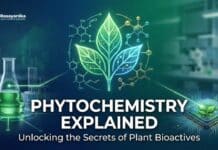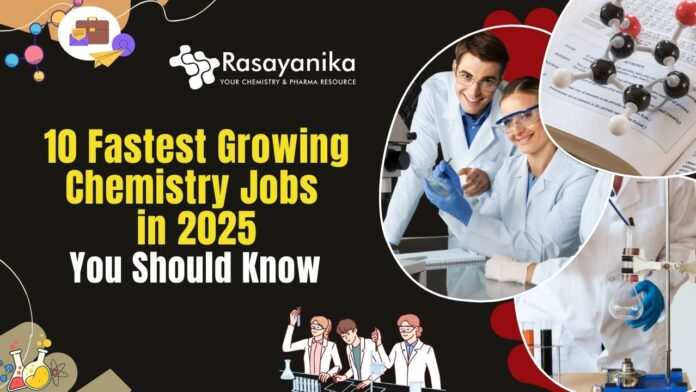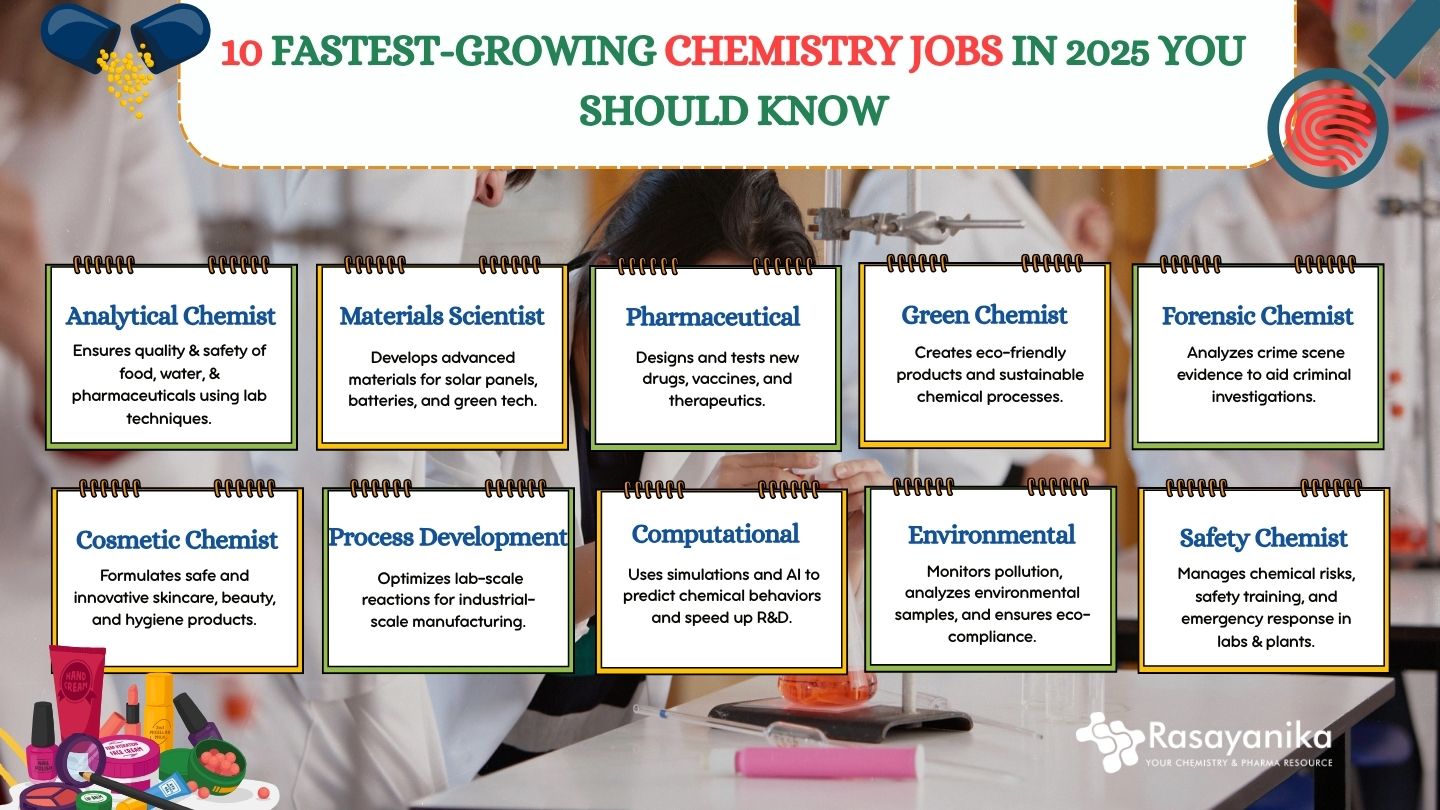Fastest Growing Chemistry Jobs in 2025
Have you ever looked at the world around you and wondered what makes it all work—from the medicine that saves lives, to the batteries powering your smartphone, to the biodegradable packaging replacing plastic? The answer often lies in Chemistry. It’s the invisible force shaping almost every part of our daily lives.
But here’s the exciting part: In 2025, Chemistry is no longer just about mixing solutions in a laboratory. It’s evolving, giving rise to some of the fastest-growing chemistry jobs 2025 across pharmaceuticals, green energy, and AI-driven science. It’s evolving into a powerful, interdisciplinary science fueling revolutions in Biotechnology, Artificial Intelligence, Green Energy, Pharmaceuticals, and Sustainable Innovation. The demand for chemists is increasing rapidly.
Whether you’re a student choosing a career path, a graduate planning your next move, or a professional looking to transition into a high-impact field, Chemistry offers more opportunities than ever. It’s not just about jobs—it’s about solving real-world problems and creating a better future.
In this article, we’ll explore 10 of the fastest-growing chemistry careers in 2025, why they matter, and how you can be part of this scientific renaissance.
Table of Contents
1. Analytical Chemist
Let’s explore the fastest-growing chemistry jobs in 2025 and why they are transforming the future of science and industry.
Role & Responsibilities: Analytical chemists use modern laboratory techniques, such as chromatography, spectroscopy, and mass spectrometry, to analyze chemical compounds. Their main goal is to determine the composition, structure, and quality of substances found in food, pharmaceuticals, and the environment.
Key Skills:
- Precision and attention to detail
- Instrumentation knowledge
- Data analysis and problem-solving
- Knowledge of Good Laboratory Practices (GLP)
Why It’s Growing in 2025:
Pharmaceutical industries are under increasing pressure to meet strict safety and quality regulations. From pharmaceutical quality control to testing contaminants in food and water, analytical chemists are in high demand worldwide.
2. Materials Scientist
Role & Responsibilities:
Materials scientists study the structure and properties of materials at the atomic and molecular levels. They design and test new materials for use in high-performance products such as solar panels, batteries, biodegradable plastics, and aerospace components.
Key Skills:
- Knowledge of polymers, ceramics, and composites
- Microscopy and materials testing
- Research and development (R&D) skills
- Collaboration with engineers and manufacturers
Why It’s Growing in 2025:
With the increasing need for energy-efficient, sustainable, and lightweight materials, renewable energy, electronics, and construction sectors are investing heavily in material innovation.
3. Pharmaceutical Chemist
Role & Responsibilities: Pharmaceutical chemists work on designing, developing, and testing new drug compounds. They are involved in every stage from initial research to formulation, clinical trials, and manufacturing.
Key Skills:
- Organic and medicinal chemistry knowledge
- Regulatory understanding (e.g., FDA or EMA guidelines)
- Laboratory synthesis and formulation techniques
- Attention to safety and compliance
Why It’s Growing in 2025:
The global demand for new treatments and vaccines, especially in the post-pandemic world, creates more opportunities in pharmaceutical research, biotech startups, and healthcare innovation hubs.
4. Green Chemist (Sustainable Chemist)
Role & Responsibilities: Green chemists aim to create processes and products that reduce or eliminate hazardous components. They help design biodegradable materials, energy-efficient production methods, and eco-friendly chemicals.
Key Skills:
- Understanding of environmental chemistry and toxicology
- Process design with sustainability in mind
- Lifecycle assessment
- Knowledge of renewable resources
Why It’s Growing in 2025: As climate change remains an important concern, the chemical industry is adopting green chemistry principles and methods to reduce its environmental footprint. Governments are also introducing stricter eco-friendly regulations, boosting demand for sustainable chemical practices.
5. Forensic Chemist
Role & Responsibilities: Forensic chemists analyze physical evidence collected from crime scenes, such as blood samples, drugs, fingerprints, and unknown substances. Their findings can be used in criminal investigations and court trials.
Key Skills:
- Analytical testing techniques (e.g., GC-MS, FTIR)
- Knowledge of legal protocols and evidence handling
- Strong report writing and courtroom communication
- Ethical integrity and attention to detail
Why It’s Growing in 2025: Advancements in forensic technology and increased investment in law enforcement science are driving job growth. The rise of cybercrime and drug-related investigations also fuels demand for forensic expertise.
6. Cosmetic Chemist
Role & Responsibilities: Cosmetic chemists formulate personal care products such as lotions, shampoos, and makeup. They research active ingredients, ensure safety, and work on textures, fragrance, and shelf-life stability.
Key Skills:
- Formulation science and dermatology basics
- Cosmetic regulatory knowledge (e.g., FDA or EU regulations)
- Microbiology and product stability testing
- Creative and consumer-oriented mindset
Why It’s Growing in 2025: The cosmetics industry is rapidly expanding, especially focusing on clean beauty, vegan products, and natural formulations. Consumers demand more transparency and safety in personal care products, leading to a surge in cosmetic R&D roles.
7. Process Development Chemist
Role & Responsibilities: Process development chemists work on scaling up chemical processes from laboratory research to full-scale industrial production. They optimize yield, effectiveness, safety, and environmental impact of chemical processes.
Key Skills:
- Process chemistry and chemical engineering basics
- Batch processing and scale-up techniques
- Safety protocols and risk management
- Data interpretation and process modeling
Why It’s Growing in 2025:
With the rise of pharmaceutical manufacturing, biotech innovation, and specialty chemicals, companies need experts to transition safe and efficient processes from lab to industry while reducing time and costs.
8. Computational Chemist
Role & Responsibilities: Computational chemists use computer simulations and mathematical models to understand chemical reactions and predict molecular behavior. They are important in drug discovery, material design, and AI-driven chemistry.
Key Skills:
-
Programming (e.g., Python, R, C++)
-
Molecular modeling tools (e.g., Gaussian, AutoDock)
-
Quantum chemistry and molecular dynamics
-
Collaboration with AI and data science teams
Why It’s Growing in 2025:
Artificial Intelligence and Machine Learning are being adopted across research and development fields. Computational chemistry helps speed up discoveries and reduce the need for costly experiments, making it one of the most futuristic careers in science.
9. Environmental Chemist
Role & Responsibilities: Environmental chemists monitor and study the effects of chemicals on ecosystems. They test air, water, and soil for pollutants, recommend cleanup methods, and help design sustainable industrial practices.
Key Skills:
- Knowledge of environmental laws and impact assessments
- Sampling and testing procedures
- Toxicology and pollutant behavior
- Communication and reporting skills
Why It’s Growing in 2025: Government agencies are prioritizing environmental health. As a result, environmental chemists are needed to meet sustainability goals, manage industrial waste, and comply with international environmental regulations.
10. Chemical Safety Specialist
Role & Responsibilities: Chemical safety specialists develop and enforce safety protocols in laboratories and industrial settings. They oversee chemical handling, waste management, employee training, and emergency response planning.
Key Skills:
- Deep knowledge of hazardous materials and MSDS
- Safety standards (e.g., OSHA, REACH)
- Risk assessment and compliance
- Leadership and training capabilities
Why It’s Growing in 2025: Workplace safety is a top priority in chemical-intensive industries. With increasing regulatory and ethical responsibilities, the demand for chemical safety officers is growing to ensure compliance and protect workers and the environment.
The fastest-growing chemistry jobs in 2025 will no longer be limited to traditional roles. It is a field bursting with creativity, collaboration, and cutting-edge tools and technologies such as AI and automation. It’s where science meets purpose—and people like you make it possible. These ten fast-growing chemistry careers aren’t just trends; they are gateways. They offer you the chance to combine your curiosity with meaningful action, to innovate responsibly, and to be at the heart of the most significant global problems, challenges, and solutions.
So, if you’ve been wondering whether a career in Chemistry is worth pursuing, here is your answer: The world needs more thinkers, solvers, and creators. It needs more chemists. It requires passionate future researchers like you.

















































